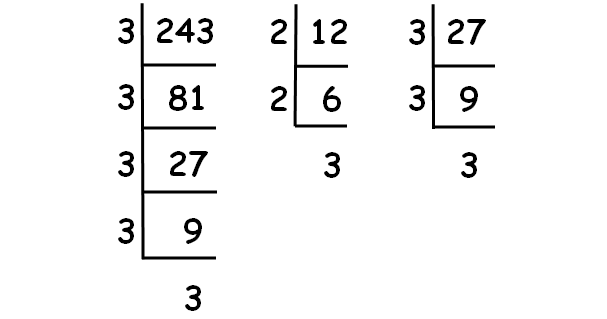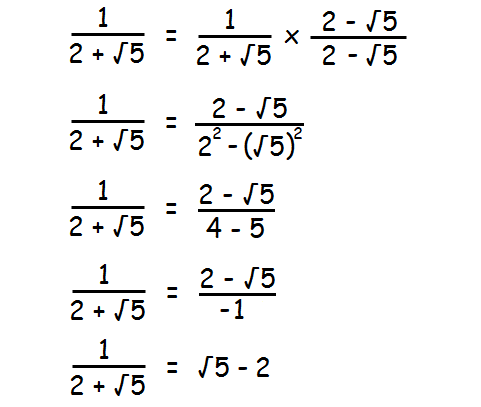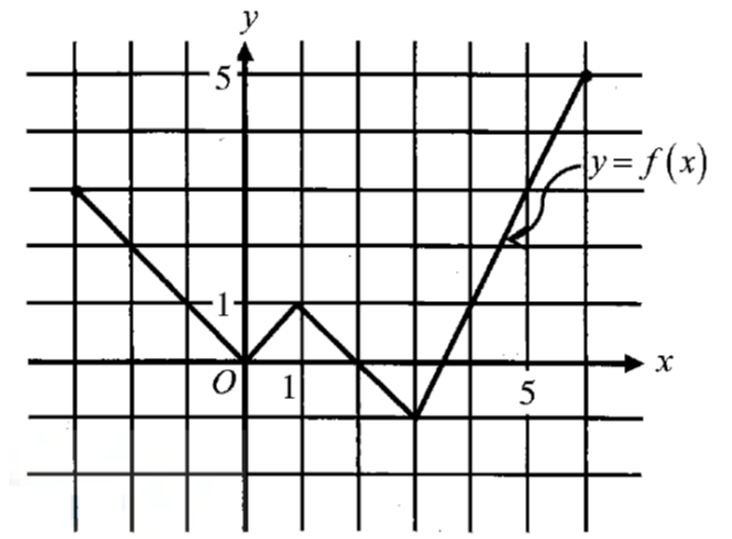SIMPLIFYING RADICAL EXPRESSIONS : MIXED REVIEW
How to simplify radical terms ?
Example 1 :
√a ⋅ √a = a
Example 2 :
√(a ⋅ a) = a
Example 3 :
√a ⋅ √b = √(ab)
Example 4 :
√a / √b = √(a/b)
Example 5 :
√a + √a = 2√a
Example 6 :
3√a - 2√a = √a
Mixed Review
Question 1 :
Simplify :
√5 ⋅ √18
Solution :
√5 ⋅ √18 = √5 ⋅ √(3 ⋅ 3 ⋅ 2)
√5 ⋅ √18 = √5 ⋅ 3√2
√5 ⋅ √18 = 3√(5 ⋅ 2)
√5 ⋅ √18 = 3√10
Question 2 :
Simplify :
3√7 ⋅ 3√8
Solution :
3√7 ⋅ 3√8 = 3√7 ⋅ 3√(2 ⋅ 2 ⋅ 2)
3√7 ⋅ 3√8 = 3√7 ⋅ 2
3√7 ⋅ 3√8 = 23√7
Question 3 :
Simplify :
3√35 ÷ 2√7
Solution :
3√35 ÷ 2√7 = 3√35 / 2√7
3√35 ÷ 2√7 = (3 / 2) ⋅ (√35 / √7)
3√35 ÷ 2√7 = (3 / 2) ⋅ √(35 / 7)
3√35 ÷ 2√7 = (3 / 2) ⋅ √5
√5 ⋅ √18 = 3√5 / 2
Question 4 :
Simplify :
3√56 ÷ 3√7
Solution :
3√56 ÷ 3√7 = 3√(56 ÷ 7)
3√56 ÷ 3√7 = 3√8
3√56 ÷ 3√7 = 3√(2 ⋅ 2 ⋅ 2)
3√56 ÷ 3√7 = 2
Question 5 :
Simplify :
√3(√3 + √12)
Solution :
√3(√3 + √12) = √3 ⋅ √3 + √3 ⋅ √12
√3(√3 + √12) = 3 + √(3 ⋅ 12)
√3(√3 + √12) = 3 + √36
√3(√3 + √12) = 3 + 6
√3(√3 + √12) = 9
Question 6 :
Simplify :
(3 - √2)(3 + √2)
Solution :
Using the algebraic identity a2 - b2 = (a + b)(a - b),
(3 - √2)(3 + √2) = 32 - (√2)2
(3 - √2)(3 + √2) = 9 - 2
(3 - √2)(3 + √2) = 7
Question 7 :
Simplify :
√(5/9y4)
Solution :
√(5/9y4) = √5 / √9y4
√(5/9y4) = √5 / √(3y2 ⋅ 3y2)
√(5/9y4) = √5 / 3y2
Question 8 :
Simplify :
(√3)3 + √27
Solution :
(√3)3 + √27 = (√3 ⋅ √3 ⋅ √3) + √(3⋅ 3 ⋅ 3)
(√3)3 + √27 = (3 ⋅ √3) + 3√3
(√3)3 + √27 = 3√3 + 3√3
(√3)3 + √27 = 6√3
Question 9 :
Simplify the radical expression :
√243 - 5√12 + √27
Solution :
Decompose 243, 12 and 27 into prime factors using synthetic division.

√243 = √(3 ⋅ 3 ⋅ 3 ⋅ 3 ⋅ 3) = 9√3
√12 = √(2 ⋅ 2 ⋅ 3) = 2√3
√27 = √(3 ⋅ 3 ⋅ 3) = 3√3
So, we have
√243 - 5√12 + √27 = 9√3 - 5(2√3) + 3√3
Simplify.
√243 - 5√12 + √27 = 9√3 - 10√3 + 3√3
√243 - 5√12 + √27 = 2√3
Question 10 :
Simplify :
(8√3)2
Solution :
(8√3)2 = 8√3 ⋅ 8√3
(8√3)2 = (8 ⋅ 8)(√3 ⋅ √3)
(8√3)2 = (64)(3)
(8√3)2 = 192
Question 11 :
Simplify :
(8√117) ÷ (2√52)
Solution :
Decompose 117 and 52 into prime factors using synthetic division.

|
√117 = √(3 ⋅ 3 ⋅ 13) √117 = 3√13 |
√52 = √(2 ⋅ 2 ⋅ 13) √52 = 2√13 |
(8√117) ÷ (2√52) = 8(3√13) ÷ 2(2√13)
(8√117) ÷ (2√52) = 24√13 ÷ 4√13
(8√117) ÷ (2√52) = 24√13 / 4√13
(8√117) ÷ (2√52) = 6
Question 12 :
Simplify :
1 / (2 + √5)
Solution :
Simplifying the above radical expression is nothing but rationalizing the denominator.
So, rationalize the denominator.
Here, the denominator is 2 + √5.
In the given fraction, multiply both numerator and denominator by the conjugate of 2 + √5. That is 2 - √5.

Question 13 :
Simplify :
2 / √3
Solution :
Simplifying the above radical expression is nothing but rationalizing the denominator.
So, rationalize the denominator.
Here, the denominator is √3.
In the given fraction, multiply both numerator and denominator by √3.
2 / √3 = (2√3) / (√3 ⋅ √3)
2 / √3 = 2√3 / 3
Question 14 :
Simplify :
1/√2 + 1/√5
Solution :
To add the above two fractions, make the denominators same.
Least common multiple of √2 and √5 is
= √2 ⋅ √5
= √(2 ⋅ 5)
= √10
Then,
1/√2 + 1/√5 = √5/√10 + √2/√10
1/√2 + 1/√5 = (√5 + √2) / √10
To rationalize the denominator on the right side, multiply both numerator and denominator by √10.
1/√2 + 1/√5 = [(√5+√2)√10] / (√10 ⋅ √10)
1/√2 + 1/√5 = (√50 + √20) / 10
1/√2 + 1/√5 = (√(5 ⋅ 5 ⋅ 2) + √2 ⋅2 ⋅ 5) / 10
1/√2 + 1/√5 = (5√5 + 2√5) / 10
Question 15 :
Simplify :
(6 + √5) / (6 - √5)
Solution :
Simplifying the above radical expression is nothing but rationalizing the denominator.
So, rationalize the denominator.
Here, the denominator is 6 - √5.
In the given fraction, multiply both numerator and denominator by the conjugate of 6 - √5. That is 6 + √5.
(6 + √5) / (6 - √5) = [(6+√5)(6+√5)] / [(6-√5)(6+√5)]
(6 + √5) / (6 - √5) = [(6+√5)(6+√5)] / [(6-√5)(6+√5)]
(6 + √5) / (6 - √5) = (6 + √5)2 / [62 - (√5)2]
(6 + √5) / (6 - √5) = [62 + 2(6)(√5) + (√5)2] / (36 - 5)
(6 + √5) / (6 - √5) = [36 + 12√5 + 5] / 31
(6 + √5) / (6 - √5) = (41 + 12√5) / 31
Kindly mail your feedback to v4formath@gmail.com
We always appreciate your feedback.
©All rights reserved. onlinemath4all.com
Recent Articles
-
SAT Math Resources (Videos, Concepts, Worksheets and More)
Jan 04, 25 10:29 AM
SAT Math Resources (Videos, Concepts, Worksheets and More) -
Digital SAT Math Problems and Solutions (Part - 96)
Jan 04, 25 10:26 AM
Digital SAT Math Problems and Solutions (Part - 96) -
Simplifying Complex Fractions Problems and Solutions
Jan 04, 25 12:31 AM
Simplifying Complex Fractions Problems and Solutions
